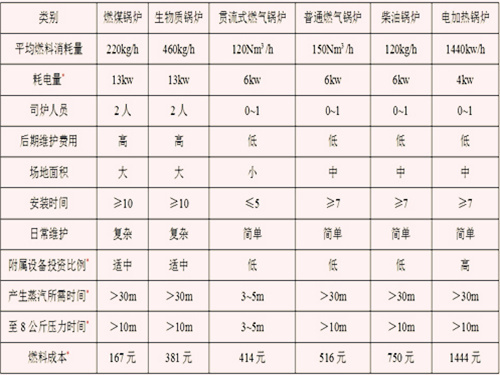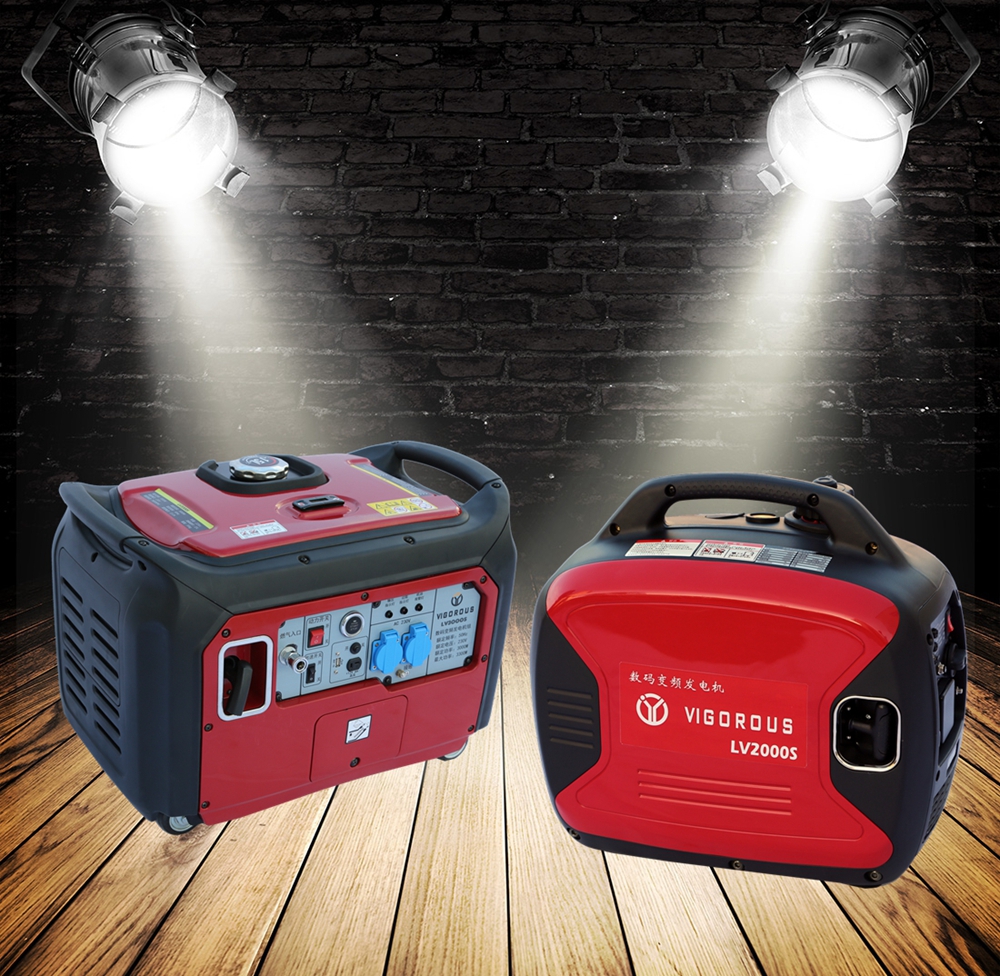Common boiler fuels on the market include coal, biomass fuel (firewood, rice husk, straw, etc.), natural gas, diesel, and electricity. Here we take a two-ton boiler as an example to compare the operation cost of a few kinds of fuel boilers and actual operation. There is a slight difference in the fuel prices in different regions. Please check the actual local cost. 1. More Efficient and Silent----Inverter Dual Fuel Generator can generate power according to actual demand, so they use less fuel; because of brushless alternator and special design, the generator produces less noise. Inverter Dual Fuel Generator Inverter Dual Fuel Generator,Small Inverter Dual Fuel Generator,Portable Inverter Dual Fuel Generator,Cheap Inverter Dual Fuel Generator Jiangxi Vigorous New Energy Technology Co., Ltd. , https://www.vigorouspower.com
We use coal (AII standard coal, heating value 5000kcal/kg) 700 yuan/ton, biomass fuel (calorific value 3000kcal/kg) 800 yuan/ton, natural gas (calorific value 9000kcal/m3) 3.4 yuan/m3, 0# diesel (heat value 11000kcal/kg) 6.2 yuan/kg, industrial electricity 1 yuan/degree, calculated every month for 30 days, and stove personnel are calculated at 3,000 yuan per person per month.
Tubular boilers are divided into gas and fuel types. Here, we only compare gas types (see the top of the page for comparison).
Through the above comparison, we can see that coal-fired boilers have lower fuel costs due to lower coal prices, followed by biomass fuels, natural gas, diesel, and electricity in turn. Moreover, the electric heating boiler needs to be equipped with a separate transformer equipment, and the impact on the power grid during operation is relatively large. The market is common with electric heating boilers of 1 ton or less, and domestic and foreign markets with electric heating boilers of more than 1 ton are rare. Diesel boilers need to be equipped with separate oil storage tanks, and in some areas with high environmental requirements, diesel boilers are also prohibited.
With today’s increasingly stringent environmental protection policies, biomass boilers are an ideal boiler between coal and natural gas. Their price is not as high as natural gas, and pollution is not as high as coal, which seems to be a comparison. The perfect product; but if you consider it from another perspective, there are many drawbacks when it comes to actual operation: First, the fuel supply problem, the type of biomass fuel is more, the market is chaotic, and it is difficult for consumers to buy the right product; Second, the price issue, the price of biomass fuel is not uniform, and there is no uniform standard for quality, and it is easy to be deceived; Third, environmental issues, biomass fuel has certain environmental advantages compared to coal fuel, but its combustion will also produce Dust and other contaminants still need to be treated before they are released into the atmosphere. In addition, the use of biomass boilers is forbidden in areas with high environmental protection requirements; and, with the gradual supply of natural gas, all boilers eventually need to be replaced. For the gas boiler, by then, it is a big investment.
In summary, we recommend natural gas boilers to you. Natural gas boilers have their unique advantages that other types of boilers cannot match. Mainly have the following characteristics: First, no pollution, natural gas is carbohydrate, after combustion is mainly carbon dioxide and water, no other pollutants; Second, a high degree of automation, natural gas boiler can be realized unattended, fully automatic control. Save labor costs; Third, the structure is compact, natural gas boilers are smaller than coal-fired and biomass boilers, and the floor space is small, saving infrastructure investment. Fourth, low maintenance costs in the later period, natural gas boilers generally use imported burners, stainless steel feed pumps, stable performance, less mechanical equipment, low maintenance costs.
Our common gas-fired boilers are generally horizontal (with a vertical structure, generally less than 1 ton). Now our company has introduced a new gas-fired boiler-through-flow boiler from Japan. The structure has a small footprint and has 0.5 tons, 1 ton, 2 ton and 4 ton tonnage. Different from the conventional horizontal gas boilers and vertical gas boilers, the tubular boilers are evenly arranged inside the tubular boilers. They do not have a drum, and have a large heating area and a high thermal efficiency. The whole factory installation requires only the burners, chimneys, etc. to be installed on site. Equipment can be quickly put into use. The biggest feature of the tubular boiler is that in addition to its small footprint, the most notable feature is the production of steam in 3 minutes, which means that it takes only 180 seconds from the time the cold water enters the boiler to steam generation; it produces 8 kg of pressure steam It will not exceed 10 minutes. For non-24-hour production enterprises, each startup can save nearly 40 minutes of burning time. This way, it can save about 2,880 square meters of natural gas each month, and save 350,040 square meters of natural gas in one year! This is a very impressive figure. According to the calculation of 3 yuan/square, it can save about 105,120 yuan per year! This is just a start-up cost savings every day. It is equipped with an energy saver, and its thermal efficiency is 2 to 3% higher than that of conventional gas boilers. This can save a considerable amount of money.
In summary, the tubular gas boiler is your best choice!
*Power consumption: In the actual operation of the boiler, the mechanical equipment will not be running except the blower and induced draft fan. The listed power consumption is higher than the actual power consumption.
* Auxiliary Equipment Investment Ratio: Coal-fired (biomass) boilers are mainly dust-removing equipment (optional). Gas-fired boilers do not include natural gas pipelines. Diesel-fired boilers are mainly fuel storage equipment. Electric heating boilers are mainly used to set up separate transformers.
* Time required to generate steam: The time required after each shutdown, after the interval time (with boiler cooling as the boundary) to start again until steam generation begins.
* To 8 kg pressure time: refers to the time required for the boiler to reach 8 kg pressure after the boiler starts to generate steam; because most users actually use the air pressure within the range of 6 to 10 kg, an example of 8 kg pressure is used here.
* Fuel Cost: The cost of fuel cannot represent the overall operating cost of the boiler, and the overall operating cost of the boiler needs to be considered comprehensively.
2. More Fuel Options----The fuel of Inverter Dual Fuel Generator can be natural gas(NG) and liquefied petroleum gas(LPG) and Gasoline. Thus, you can have more fuel options and wider application range.
3. High Quality Output----With 100% copper wire and brushless permanent magnet alternator(easy maintenance), advanced OHV engine, Inverter Gasoline Generator converts the AC output to DC and back to AC, which produces high quality electricity.
4. Small and Light Design----Smaller engine and compact design lead to relatively light weight and portability.
5. VIGOROUS Inverter Dual Fuel Generator has ISO&CE Certificate.